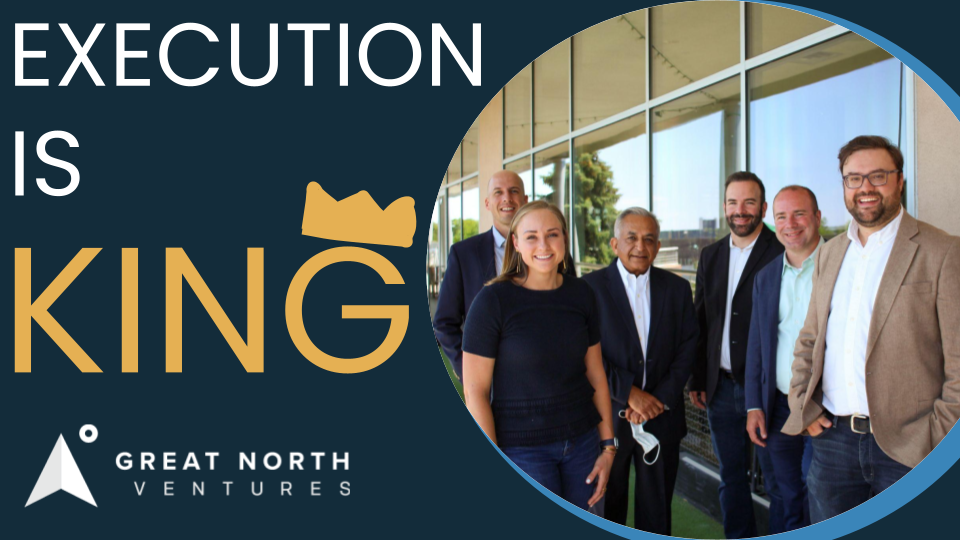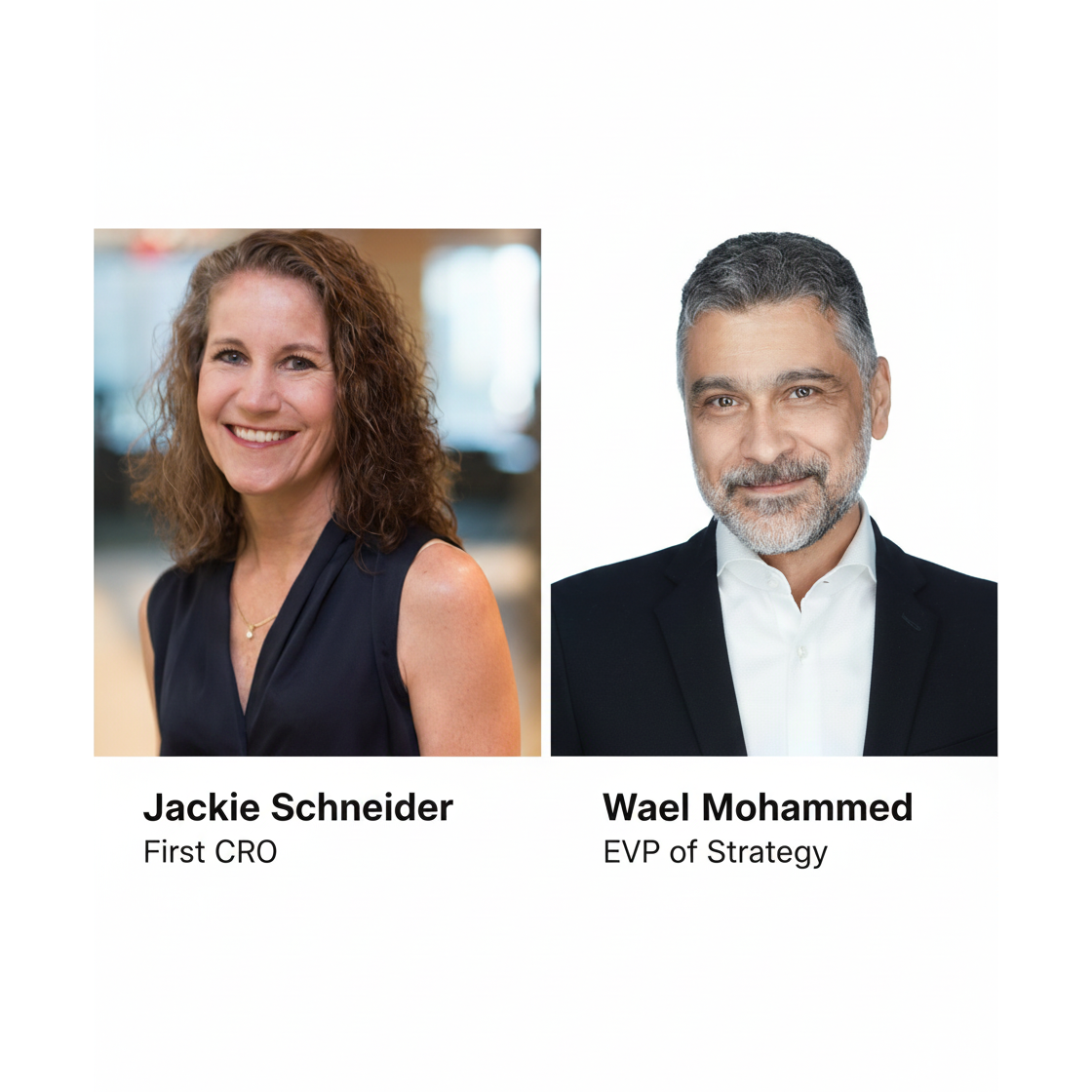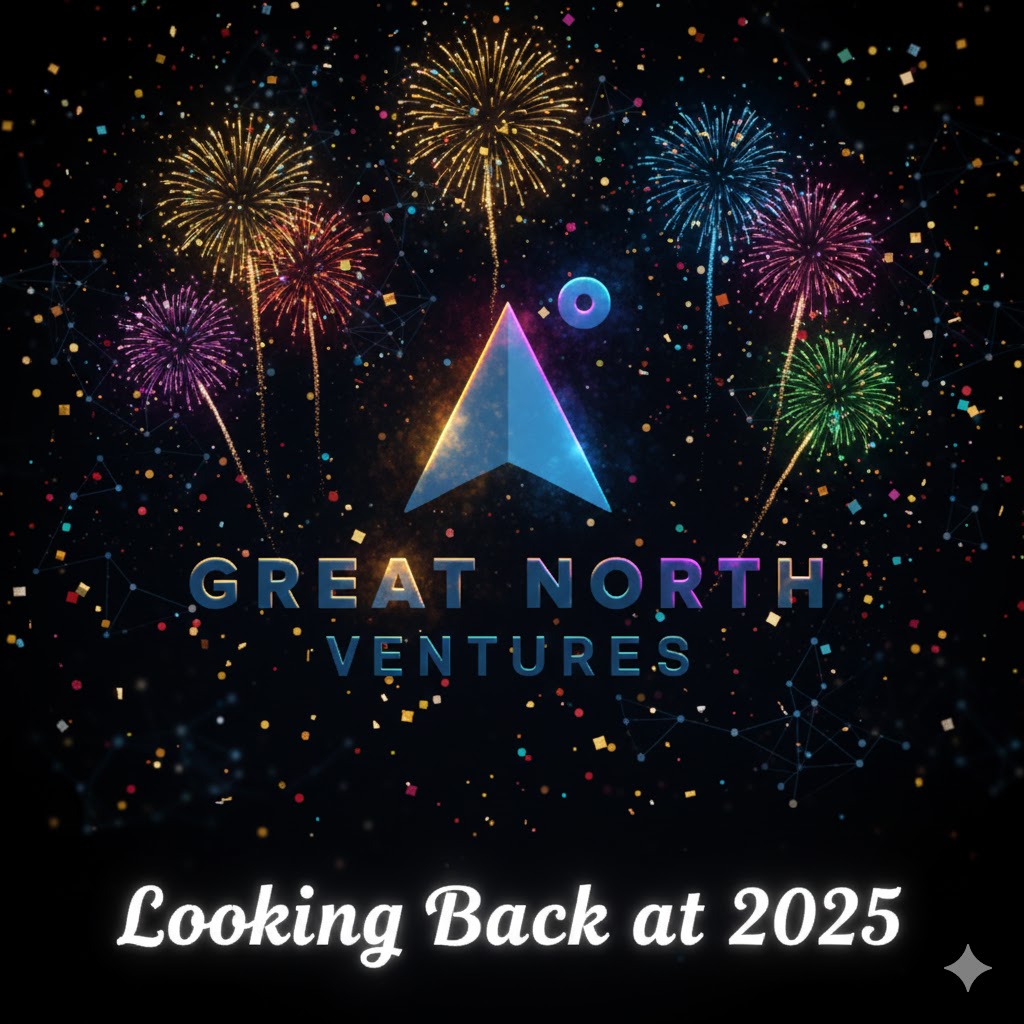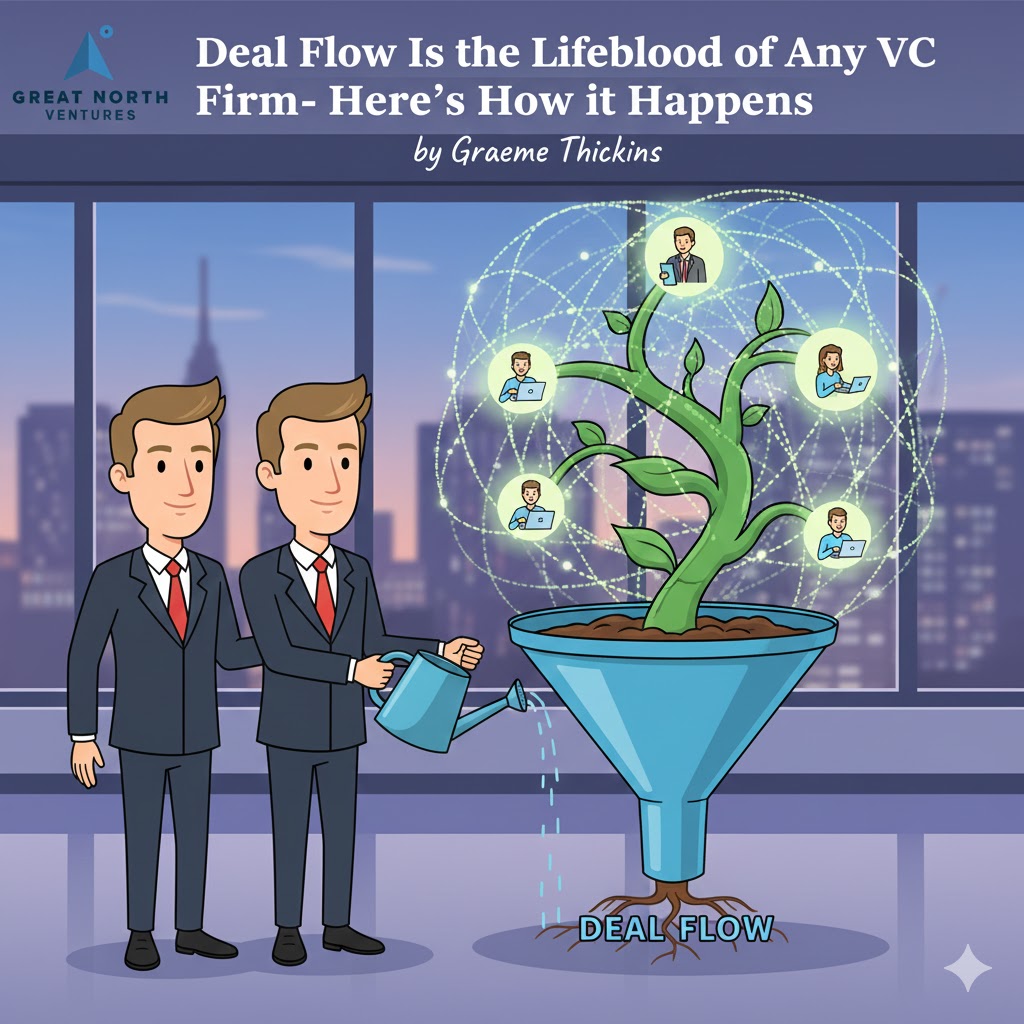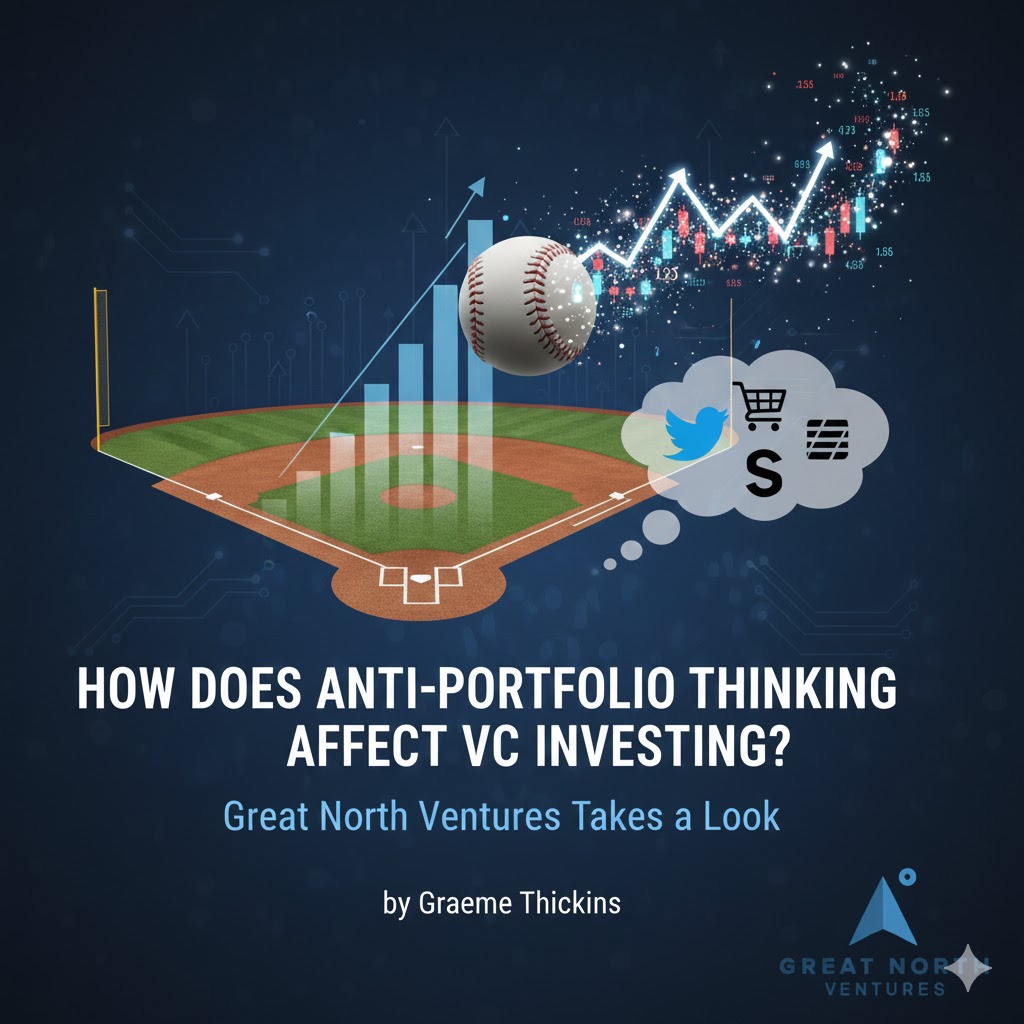In this compilation episode, Josef features the best advice for founders that we picked up at our 2021 Annual Event.
Every year, Great North gathers investors, founders, and ecosystem builders together for networking and progress updates.
In this episode, you can hear advice from our stakeholders- people who have proven they can execute- on hiring and firing, leadership, go to market, and more.
Transcript:
0:07
Welcome to the execution is King podcast where we talk to successful startup founders, investors and ecosystem builders to uncover insights and best practices for the next generation of great global startups. This month, we have a special episode, instead of a single guest. We have advice from a ton of people. Every year, we gather all of the Great North ventures stakeholders together to network an update on the funds progress. This year, we asked attendees, founders, investors and builders, questions centered on quality execution. What’s the best advice you have for founders out there? When it comes to team building, specifically hiring and firing?
0:49
hiring and firing? I’ve heard this a number of different ways. There’s the old cliches of hire slow fire quick. And then some people follow that up with hire Quick Fire quick. I like what what my co founder Chris had brought to us where you say, let’s be really careful about who we bring on the team. And use the I think he called it the shopping mall test. And that test is like, if you hired this person, like, and on a Saturday, you saw them at a at a shopping mall unexpectedly, would you want to go up and say hi to him? It seems like a simple test. But there’s, you know, some people you might want to avoid and other people you just be like, I gotta go say hi, I can’t believe I see him at the mall. on a Saturday. So yeah, so that’s, we’ve used that approach, we have really good luck, we’ve had really good luck with Team retention. Our team is really everything to us, you know, people stay with us. You know, so we were really happy with with what we’ve built so far.
1:46
That was Todd Larson, co founder of Team genius.
1:51
You know, there’s kind of the latest and greatest theme out there that is hire slowly and fire quickly. I’m kind of borrowing that. But you know, in my career, I think being upfront with people and really focusing on making sure that as a leader, we’re all about doing servant leadership and removing roadblocks for people, and making them be the best that they can be. And really celebrating that I think is super important. That’s the way that I try to manage my teams, I try to surround myself with smart people that can bring things to the table that I necessarily don’t see right away. But I think as a team, you collaborate and you always come up with the best ideas and the best approaches. And the sum of all parts is better than just one individual.
2:36
That was James Don Francesco, president and co founder of Next Gen.
2:42
So I’ve always had a fail fast mentality, where founders typically will always just bring anyone they can get their hands on into their company, some unemployed person, their uncle, a friend. And that’s okay, in the very, very, very beginning. But as you start getting traction, if people aren’t performing well, or aren’t doing their own basic jobs, you have to cut bait, you have to get out of it. You have to make sure you’re working with people in your startup that are moving the ball every day. And if you’re in your gut, you know that somebody’s not making it I’ve seen founders be really, they’re committed to people that were there in the beginning, because those people were there in the beginning. And so they think being committed to people who were committed is a great rule. It’s a horrible rule. And it kills the opportunity for everybody. And so especially as you start getting eight and 10 people into your business, everybody knows who the nonperforming person is. But as the CEO or founder if you don’t deal with that, you start losing a lot of credibility and hindering everybody else’s opportunity.
3:55
That was Doug Berg, former founder of zap info,
4:00
growth mindset. It’s really the the number one thing that I look for when hiring people I try to look for, have you started a business a side business? Have you created something on your own? Have you demonstrated some interest in learning and getting better and being humble about what you know or don’t know? And I find that that trumps you know, experience all day as if you’ve just you’ve shown that grit to, you know, grow and persevere.
4:25
That was Chris Knutson, CEO and co founder of Team genius.
4:30
Like just general advice that I learned from doing a startup is, is really not I think, really focus on what your company’s the best at and, and not try to invent the wheel on every element. I think leverage the the knowledge of the community and your advisors, your your investors is really key.
4:52
That was Brian Biss Bala, former co founder of Ramboll and code 42.
4:58
Well, I think you got to look at hiring and firing as finding the right spot for people. And when you’re letting someone go, it’s probably because they need to go someplace else versus the emotion of the difficulty, like people have an opportunity to do great things. Sometimes they get stuck in a certain spot where they just don’t want to move to the next level or the next opportunity. So sometimes you’re kind of like letting them find their next chapter, that might be their best chapter. Certainly listening, being empathetic. It’s not easy, though, to let people go, certainly in the hiring side, business is all about people. And so you cannot take the people side of things for granted at all, you have to be very deliberate, very careful with hiring, it’s very easy to hire, very difficult to fire. So being very careful, making sure that you’re just not cutting corners on people. At the end of the day, we’re all in the people business. And so you want to make sure you have the best possible people. And so being very careful in how you onboard people, and also make sure they’re part of the culture of your organizations huge.
6:01
That was Brian Shawn born attorney at Moss and Barnett, I think
6:05
the core of it is always hire people smarter than yourself, and empower them to use their expertise, and understand what’s blocking them or what they knew needed to do their job. And then stay out of their way. And that is really hard to do. You care, you started the business. So you have some expertise, right. So you have to be kind of humble with where your expertise ends, and there’s begins or certainly eclipses yours. But you know, you’re hiring these people, because they’re really good at something that you’re not good at. Otherwise, you’re hiring wrong. You’re hiring people like you, you’re just way off base, I think the best place to start there is you have to figure out your mission, your vision and your values. And that allows you to make very easy decisions. And then people are, you know, no fault of them. They’re not bad people. It’s just they fit or they don’t. And it’s better for everyone, if you get people who fit what you’re trying to do, where you’re trying to go and how you want to do it. And then it’s really hard to do, especially in early stage companies, you got to do the performance management thing. You got to you got to hold people accountable, and make sure people are doing what they say they’re doing.
7:21
That was Andrew Schultz, CEO and co founder of noiseaware. What’s your best advice when it comes to leadership?
7:30
I would say the best advice I’ve gotten and I truly believe it is you have to love what you do and be passionate about what you do. Because as a leader, especially a CEO of a tech startup, you’re gonna face a lot of obstacles and challenges. And you got to love what you do to get through it and to get to the other side. And then you got to make your team inspire a team to get through the tough times to celebrate the good times. Without that passion can’t be done. I think with leadership, it’s one thing that’s really important for CEOs and co founders that grow something from, you know, two employees to 50 employees to 100 employees is to stay focused on the future and the vision and the mission of the company, be the one setting the metrics and the goals. But don’t be the one that’s in the in the weeds, really making people feel micromanage. So my biggest advice is stay really focused and laser focused on what are the where’s the big picture? Where are you going? And what are those important metrics that run your business. And that’s where you should be managing versus in the weeds.
8:35
That was Julie Roth Novak, CEO and co founder of party slate,
8:39
I would say two main piece of advice for leadership. One is you know, the old cliche of hire people smarter than you and get out of their way. There’s that notion that, you know, if you create a startup, you do it for one of two reasons. You either want to be rich or you want to be king. I’m personally one that wants to be rich. At the end of this, I don’t have to be in charge of a full team. I don’t have to be the boss and make sure that I command this team of people every day. So I’ve replaced myself and just about every job that I’ve done so far, including head of engineering. So that’s, that’s, that’s one of the biggest pieces of advice that I’d give.
9:17
That was Todd Larson.
9:20
Leadership wise, I would say the best advice that we’ve been given is around hiring, hiring great leaders and hiring them earlier than you think. And then I would say, I mean, the types that you want to be in business with are already pretty curious and have a mentor network, ideally that they’re working with. But having folks that can help you kind of learn some of the stuff you don’t know. And then then the other piece would be for us. We did something called the Entrepreneurial Operating System that came from a book called traction. So for us that was actually helping us like organize how we work. I mean, leadership, I think is just us being really authentic about what we’re doing where we’re going. And then doing that with a system like EOS has been really where that worked for us.
10:12
That was Ryan Hansen, CRO and co founder of dispatch.
10:16
Yeah, I think kind of in the same theme, right. But Angela Aaron’s who was the retail and apple.com. President, back when I was there, in 2014 2015. And she would always say, look, as a leader, I think you just have to basically eliminate roadblocks. Tell the people where you’re going. And again, make it so that they can be the best that they can be and show up to work every day with their best attitude. And, you know, feel free to ask questions, and basically work as a team. And I like that model for basically, hey, as a leader, I need to remove roadblocks for my people so they can do the best they can.
10:57
That was James Don Francesco.
10:59
trust people, I think is the biggest thing, find great people to work with. Because at the end of the day, you’re only as good as you are and the more quality people that you can instill trust into and they can trust you back, I think that’s really going to lead to like, ultimate success.
11:14
That was Andrew Schultz. Again,
11:17
I think leadership comes from the heart. You know, you lead from the heart, the meaning of life is love, and all mouths this time. So you find what you love, the purpose, passion. And when you’re into something, when you believe when you’re committed, leadership kind of comes audio doesn’t matter what sort of person you are, whether you’re an introvert or an extrovert, leaders lead with their heart, the best leaders lead with their heart, and they connect their time with the stuff they’re passionate about. And so following your heart, as a way to success and happiness, and leader being a great leader, too.
11:50
That was Brian, Shawn born again. What advice do you have for founders on go to market and customer acquisition?
11:59
So I founded a few companies. And frankly, I think I did a pretty good job of knowing like, when my product was ready to kind of show to people, I’ve met a lot of other founders that have kind of over baked or tried to over build their technology. So it was perfect and ready to go to market. And really, all you need to do is get it so that it’s ready to demo ready to show and ready to get the first couple of customers that will then help you to build the rest of the product. And to the point where they’ll even pay you to help build it the way they would want it to be. And so I’ve just seen a lot of value in like selling your idea. Maybe before it’s even an MVP, but allowing customers to pull you forward in innovation, as opposed to just a salesperson or your own ideas. I’ve seen things go off the rails a lot where a founder overthinks things and over builds things. They waste time, they waste quarters, they waste years, they kill their home equity lines, they can’t get venture funding, they aren’t hearing from customers firsthand. You know, and so I just I see them circling a lot with their ideas. And again, they burn a lot of money, and they can frustrate the heck out of the tech guys that are actually building their thing. And then they they change their mind or they add, there’s always like, Hey, I’m glad you built us to hear but now we need to add these next five features for it to, in my mind be ready to go to market. I’ve been very fortunate in that. I think our Minnesota nice stuff plays really good with customer acquisition. Even if you’re selling across the country, I’ve sold to 1000s of customers, even global customers, and they always appreciate when somebody from Minnesota is selling them a solution, we tend to listen to what they want, they tend to be better configurators if you will have like what an even a demo is. So tell me what you’re after. You know, it’s kind of like what what’s the menu? What, instead of me throwing everything at you like what are you in the mood for right now. So that’s thing one, but thing too is in go to market for entrepreneurs, you just have to be very smart. Like when you acquire your first few customers, you have to pick fights you can win. So you want to find customers that aren’t difficult, who in their mind are almost like emotional investors in what you’re doing? Because it’s going to help them with a killer part of their business. And as they do that you want them to be your early cheerleaders. You want them to be your early advocates. So one of the tricks that I did was I created what I call customer advisory boards right out of the gate and I’ll see if you’ll help me innovate. You’ll help me get you into your company, I will help innovate in the direction you want me to. But I also need you to participate. Because everything today is around. No one believes the founder of this startup, but they believe the customers that you’ve helped to accomplish something. And if you can, like I would bring customers we’d won battles with. And I would be on a demo with a big customer. And I’ll say, Hey, I hope you don’t mind. But I’ve invited one of our other customers to participate in the demo today. And they’re going to share what we’ve done for them. It’s Earth changing, to be able to have that kind of participation in your deals, because you will get to market tremendously faster than hoping or waiting to build 10 customers with 10 referenceable accounts with 10, white papers with 10. You can do a lot of this stuff in the very early days, if you just know how to ask. And I think founders are shy sometimes. And they don’t ask customers, hey, if I do something really great for you, can you then not pay me back but participate. And the irony is good. Customers love innovation, and they can’t do it in their big company. So they think that you’re their outlet for how to innovate and how to do things outside of their own kind of governance and chaos. And the right ones will actually bring you deeper and deeper into their company, as well as look at you as their outlet like they learn investor even though they’re not writing you a check. And that’s just a blast, when you start to get 2468 10 of those, the snowball just goes it’s fantastic.
16:36
That was Doug Berg. Again. It’s always
16:39
harder than you think. And I think you know, there’s a lot of things that can work a little bit. And so you have to be careful about not spreading yourself too thinly with customer acquisition, find something that you can double down on and go really deep in it versus trying to do you know, all channels, all tactics at the same time.
16:58
That was Chris Newton again. In hindsight, what’s a piece of advice you wish you had received earlier on? Wow,
17:07
okay, advice I wish I had been given before starting the company, find good partners. If you want to go fast, you need to do it with a lot of other people. I’d say. I wish that we had had more advice on legal as well as capital early on to avoid some mistakes that you can’t really out execute your way out of.
17:34
That was Ryan Hansen. Again,
17:36
that’s a really good question. Number one, you can’t use an outside tech firm to build your MVP. I wasted I was just me at the beginning, I wasted probably $100,000, which at the time seemed like a lot of money. I know it’s not in the context of a big raise. But working with an outside digital agency. I thought that’s my background, I can manage them. And really what I found would have been better is to get a group of contractors get in a room whiteboard together, get them really invested in the company and build together that way. And so when my tech co founder joined me nine months after I started, we threw away everything that the digital agency build started from scratch.
18:21
That was duly rough no back again.
18:24
Try to learn from others as much as you can, I think know where you’ve reached like I you know, I think our team, we needed to get outside help sooner than we did. So it was really important to kind of seek that outside help. And we also, we did an incredible job. Kind of scaling the company from the three of us to 400 people. So that was an incredible journey and learning experience.
18:52
That was Brian Biss Bala, again.
18:55
Well, I’ll tell you some of the best advice I got from the investors as I grew the company, the first was, best time to fundraise is when you’re high on mystery and low on history. Best time to move into a new market is when you’re pulled. Read every legal document you sign. These seem fundamental but sometimes overlooked. And cliche but when you ask for advice, you get money. When you ask for money, you get advice.
19:27
That was Andrew Schultz again.
19:29
Well, I think that the idea that business is about people, you know, you get so excited about the business model, you get excited about the opportunity, the deal, and you lose sight of the execution and the people and realizing that business is about people like I mentioned and and having the right people by your side makes a difference. You having a quality people with a C opportunity, they’re going to be wildly successful. If you have C’s or DS or F people with an A plus opportunity, you’re gonna fail. So it’s finding great people realizing the importance of people and the quality of people, not just their ability mentally or to be able to execute, but just who they are as people, their ethics, their character, you know, you can you can teach them a lot along the way, but they have to be wired the right way. I think that’s that’s kind of the biggest lesson I learned along the way is just never ever lose sight of the importance of people when you have the right people and the best people with you. Everything’s possible.
20:26
That was Brian, Shawn, born again. Was there anyone who particularly went out of their way to help you to become successful? Who was it? And what did they do for you,
20:37
the startup process, I met somebody early on. So when I started building the initial MVP, my goal was to get it out in front of as many people as I could. One of the obvious connections with our player evaluation tool was with a company called AI soccer, which was founded by Scott Lieber, out down out in Silicon Valley, he had developed this sort of national standard curriculum for how to measure how good a soccer player is, through a series of 19 measurable tests. And I was sort of building my evaluation tool, using that curriculum as part of the foundation as like an example of what you could do. So I met with him in person out at the United Soccer Coaches convention, it was my first time showing off the app, he came and talked to me, gave me a lot of great encouragement, told me to go read the Lean Startup, which was a wonderful like this sort of, you know, what every founder should be reading, right? And really, really got me off to a great positive start.
21:41
That was Todd Larson. Again.
21:43
For me, and closer network, I’d say the several of the founders that I worked with that sports engine, were invaluable to me when we went out on our own journey, to be able to come back to some of those folks who were founders and had done this before and ask for their perspective, and maybe help us with with some of the items, help us kind of learn what we had no idea we didn’t know. And then I’d say, We’ve been really fortunate the network around here, in terms of like access to capital, the different like, whether it’s beta.mn, great. North is a great example. And many others, I don’t know, we’ve had great resources available to us through either the, you know, old network connections that had started businesses like this or or folks that were volunteering to help.
22:33
That was Ryan Hansen again,
22:35
yeah, I think, in the early days is an example Mindy Weiss, who’s a celebrity event planner out of LA really was drawn to our model of really focusing on events for the inspiration, not hairstyles or dresses, or, you know, great gifts, it was all about the creativity of the event itself. And so very early on Mindy Weiss, who does all the Kardashian parties and everything else, came onto our advisory board. And literally, I had just launched it was a PowerPoint in a dream. And she said, Julie, I want to help you. And by getting Mindy Weiss on board, probably one of the most well known wedding and event planners in the country, if not the world, she really legitimize what we are doing and our vision. And that helps get a lot other people on board a party slave,
23:23
that was duly Roth Novak. Again,
23:27
I would say kind of a hybrid, I have had people along the way who have mentored me, and who have really encouraged me to be the best that I can be, who have told me James, you know what, even though the crowd might say, Don’t be genuine or authentic. Sometimes you have to kind of skip ahead or omit certain things, I’ve learned that I’m going to be honest and frank, and I’m going to do the best I can every day. And so the mentors that I’ve had in my life helped solidify that. I also would say, Yeah, I’ve had to work pretty hard to get to where I am. And I think the networks that you build, even way back when I started college and met Ryan and Rob, obviously that was helpful to get to know these guys, because, you know, it’s it’s, as they always say, it’s lines, not dots, you don’t come in heavy and hope to get, you know, a top notch position. And you know, from one interview, right, you it’s a it’s a long term relationship. We’ve gotten to know each other. And I think that that’s really special. And so Robin Ryan, obviously are incredible founders themselves, incredible leaders and, you know, really people that I look up to from, you know, how do you do a startup and the subject matter expertise, in particular, Ryan as a card investor is somebody who I’ve gotten to know much deeper, because he’s got all these insights that represents my customer. And so that’s been really helpful to be able to access his brain and of course, he’s incredibly knowledgeable about that stuff.
24:56
That was James Don Francesco again
25:00
A few people along the ways some of our angel investors that were seasoned entrepreneurs and seasoned investors that had been through many different companies were able to provide with lots of, I guess, more than answers questions, because like, what I found is the answer doesn’t matter nearly as much as the question. So knowing the right things to ask at the right time, that’s probably been the best piece of advice.
25:21
That was Jai kissoon, president of treble LLC.
25:27
I’m gonna say Brian schoenborn. Brian is on our board. And, you know, he’s an investor. But he spent a lot of time you know, early on connecting the dots for us. I’d say at least half of our investors came through Brian, and he’s put a lot of time we talk to him every single week in our early days. Advisory calls put a lot of time aside for us.
25:51
That was Chris Knutson again,
25:54
well, I can’t think of anything. Any specific person other than my two co founders, I think having three founders of a company was vital, because, you know, as any startup can attest to there’s definitely ups and downs. So without the benefit of your of great partners that you really trust, the support you through those ups and downs, you know, one person can have be having a crappy day and the other person can really help keep you going. I think we had many moments where we were like, What the hell are we doing here? Why are we doing this and like that, I think the combination of having those key founders those, those people you are in battle with and living that through really help keep you going. So that I think my two partners are on was the ones that I think of top of mine. So
26:45
that was Brian Biss Bala, again,
26:47
our very first investor, I still talk to on a weekly basis, generally for less than 30 minutes, but just a real quick check in. And it’s the hardest part about starting a company and leading company is you’re kind of alone. There’s no one you can really ask for advice. You’re, by definition, the expert in the world or whatever you do. And having some outside perspective, just ask, just talk through the issues you’re dealing with is is incredibly valuable. Whether it helps or not, I still have the choice to take their advice or not. But just the ability to talk through it not feel alone is incredibly, incredibly important.
27:23
That was Andrew Schultz again. We’ll close with Jai kissoon, giving his best advice to founders on fundraising, which is just great, general advice for founders as well have your
27:37
story down. I mean, honestly, it really comes down to having that guiding mission. And I know it’s bigger than a mission statement bigger than a value statement, but and then bringing everything back to that story and being able to have you know, everything reflected from financial performance to what you’re doing in marketing, really fall in line in line with that story.
28:01
Thanks for joining us on execution is King
Transcribed by https://otter.ai

